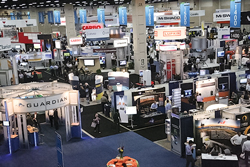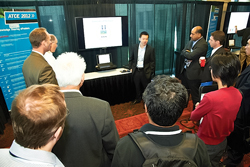|
ROGER JORDAN, Contributing Editor
With a focus on projects, facilities, and construction (PFC), this year’s SPE Annual Technical Conference and Exhibition (ATCE 2013) will be held in New Orleans, La., later this month.
This conference, organized by the Society of Petroleum Engineers (SPE), has been a leading feature in the E&P sector’s calendar for 89 years. This year, it is to be held at New Orleans’ Ernest N. Morial Convention Center, between Sept. 30 and Oct. 2.
Last year’s offering, in San Antonio, brought together 11,095 oil and gas professionals. This year, more than 12,000 professionals, from over 70 countries, are expected to attend. The conference will feature a range of panel sessions, technical sessions, pre- and post-conference SPE training courses, activities for students and young professionals, and more than 500 exhibits showcasing the latest in technology and products.
 |
| Exhibits at SPE ATCE 2012. |
|
 |
| ATCE 2012 panel discussion. |
|
 |
| Conference attendees listen to a presentation at ATCE 2012. |
|
EVENTS AND SPECIAL SESSIONS
ATCE 2013 will feature a number of special sessions and events, spread across its three-day duration. The opening general session will focus on the challenges associated with pursuing deepwater projects. Other special sessions will explore the challenges presented by Brazil’s pre-salt region, the future of shale reservoirs, the use of natural gas to power oilfield operations, knowledge-sharing on separator design, and plan continuation bias.
Deepwater Exploration and Developments-Challenging the limits. The conference’s opening session will feature a panel discussion on the challenges that “industry faces in its pursuit of deepwater exploration and development opportunities.”
The expert panel, which will include representatives from Baker Hughes, BSEE, FMC, Shell Upstream Americas, and Diamond Offshore, will discuss such issues as the pursuit of deeper reservoirs in deeper water; subsurface imaging and knowledge of petroleum systems and reservoir distribution; higher reservoir temperatures or pressures; reservoir-rock composition and properties; fluid composition and characteristics; and pushing the capacity of today’s evaluation tools and equipment.
The panel will also provide a forum, where the complexities associated with reservoir management and optimization, completion technologies, wellbore integrity and intervention, flow assurance, and floating and subsea facilities, can be addressed.
Challenges and solutions for the Brazilian pre-salt fields. Brazil’s pre-salt region represents one of the world’s most important oil discoveries in recent years. This opening day session will present an overview of the technological issues, and solutions, involved in producing oil in this challenging province.
The keynote speaker at this session will be Petrobras’ Carlos Tadeu da Costa Fraga. This session will provide attendees with a general overview of the pre-salt area; the technical aspects most important for its exploitation; reservoirs characterization; recovery factors; drilling technologies; subsea solutions; and a view of the future technologies to be applied in the region.
So, we frac’d the well, now what? Ever since George Mitchell first cracked the Barnett shale, the boom in oil and gas production has been a marvel of technical development. To date, industry has focused mainly on drilling, completions, fracturing and production. However, decisions that are made to expedite these processes can result in adverse long-term effects.
This Tuesday morning session will bring together experts, from Aera Energy LLC, Apache Corp., ConocoPhillips Co. and Texas A&M University, “to discuss the issues related to long-term viability of oil and gas production from shale.” The panelists will explore several issues, such as monitoring tools, stimulation methods and ongoing public engagement.
Powering drilling, completions and fracing with natural gas. Industry has converted drilling rigs to natural gas in many areas around the world. However, the infrastructure for fueling the rigs has been lagging. In this session, scheduled for Wednesday morning, the panel will discuss the technical, logistical and legal challenges concerning the use of natural gas to power rig operations. The session will be monitored by Rich Haut, Houston Advanced Research Center, and the panel will include representatives from Alcor Energy Solutions, Apache, Baker Hughes and Prometheus Energy.
Knowledge sharing on separator design. Reliable separation is becoming an enabling technology, as industry moves into more remote locations (e.g. deep water) and more difficult applications (e.g. heavy oil, produced water). Separation expertise is scattered around the globe, with no centralized organization to foster separation technology, fundamental research or device qualification. This session, which is being sponsored by the Separation Technology Section, will cover separation topics ranging from issues with conventional separator design to emerging technology trends.
Plan continuation bias. Two of the dangers facing the oil and gas industry are plan continuation bias and channelized behavior. Plan continuation bias is an unconscious cognitive bias to press ahead with the original plan, in spite of changing conditions. And channelized behavior occurs, when workers become task-oriented and focus on only one item. This session, scheduled for the conference’s last morning, aims to define plan continuation bias/channelized behavior, and provide some useful tools that HSE managers can use to reduce the effects on these hazards on their crews.
TECHNICAL SESSIONS
In addition to the other events, ATCE 2013 will feature a variety of upstream technical sessions. These sessions, which begin on the afternoon of Sept. 30, will cover technical disciplines as diverse as Drilling & Completions; Health, Safety & Environment; Projects, Facilities, & Construction; Management & Information; Production & Operations; and Reservoir Description & Dynamics. A sample of technical sessions open to attendees includes:
- Novel integrated workflows to
describe complex reservoirs
- Perforating technology
- A “re-look” at fracturing methods
- Digital oilfield technology
- Managing our environment:
Ground, air and water
- Data-driven predictive analytics.
SPE TRAINING
SPE training courses will be held before, and after, the conference. The courses, all of which will be held at the Hilton New Orleans Riverside, will provide industry professionals with an opportunity to accrue Continuing Education Units (CEUs).
Continuing education. A series of two-day courses, each worth 1.6 CEUs, is scheduled to run the weekend before the show starts. These courses will cover topics as diverse as asset management; hydraulic fracturing; managed pressure drilling; production data analysis for unconventional reservoirs; oilfield data mining; and reservoir simulation for practical decision-making.
In addition, a series of one-day courses, each worth 0.8 CEUs, is scheduled for Sunday, Sept. 29, and Thursday, Oct. 3. These will cover topics, such as artificial lift, ethics for engineers, waterflooding and horizontal well completions.
Petroleum engineering certification exam. SPE will also offer a certification exam for members interested in becoming certified under the SPE Petroleum Engineering Certification Program. This program provides E&P professionals an opportunity to validate technical knowledge, show a commitment to professionalism, obtain a recognized credential, and achieve employer and peer recognition.
NEW FEATURES
In line with its tradition of introducing new features and aspects to the ATCE, SPE this year will once again add a couple of new items to the agenda that will interest various groups of attendees.
One of these new items is the Young Technology Showcase. It will be located in Hall E, where there will be an elevated stage with theater-style seating, where presentations will be made during exhibit hours. The showcase will highlight young technologies in the oil, gas and related energy sectors that meet the following criteria: new technology, proven technology content, significant impact, and innovations.
As a part of this showcase, there will be a Hot Topics Stage. Here, industry professionals, who have presented during one of the technical sessions, will provide short highlights from their presentations. They will discuss new technology solutions and lessons learned.
In addition, there will be two Soft Skills Workshops. Part I will cover negotiation skills and conflict resolution. Part II will cover the Myers-Briggs Type Indicator and its applications for young professionals. 
|





